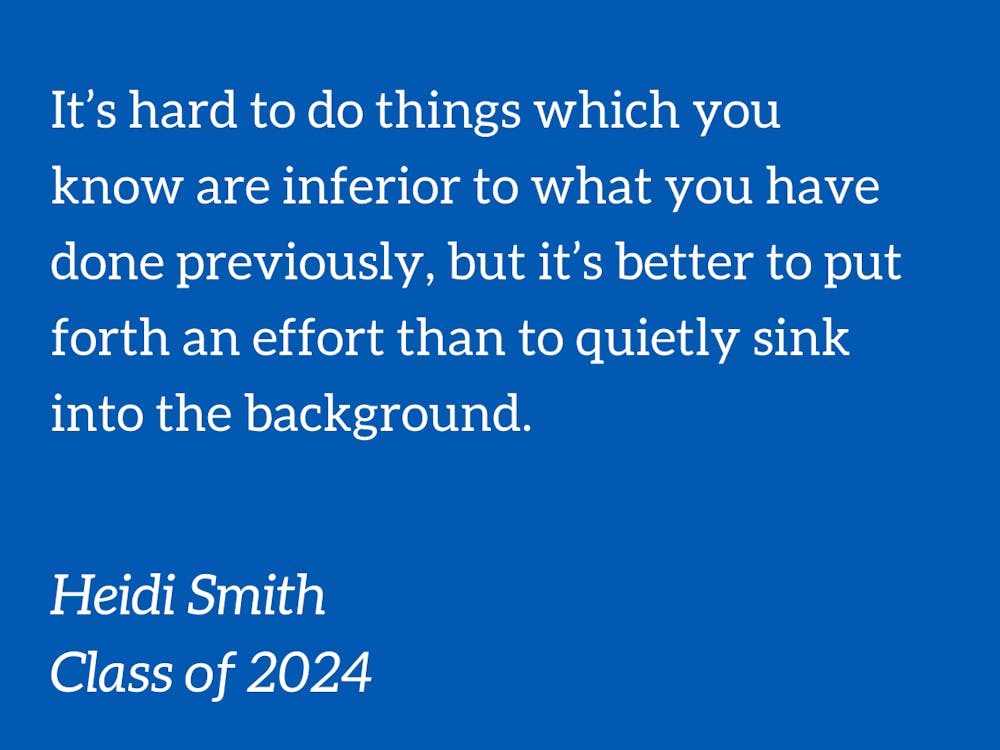After a first year of college which—given the massive shift in geography, increase in academic rigor and altered circumstances of the coronavirus–felt very personally successful, the unsustainability of achievement began to set in. Coming into college, I figured I would have to work harder than in high school but, when originally I didn’t need to work that much harder while having a better social life and more available opportunities simply by being a Duke first-year, the new necessity to expend more effort towards schoolwork, relationships and everything else felt more like a personal failure than anything else.
A certain website of dubious reputability dubs the phenomenon of the sophomore slump as “an instance in which a second, or sophomore, effort fails to live up to the relatively high standards of the first effort.” This can describe an athlete with a poor sophomore season or an artist with a flop of a second album. Or, more relevantly, a sort of malaise afflicting the sophomore class.
I had heard of this so-called sophomore slump before starting college and figured I would simply be immune. I would come into college with low expectations, and work my way up as I adjusted. When there is no hard standard for achievement, anything above the perceived average feels good. But, as it turns out, low expectations are rather easy to exceed, thus creating a new, dangerous standard of continual improvement—academically, professionally and socially.
From what I’ve gathered by talking to fellow second-years and living through it myself, last fall semester seemed to pass in a hectic haze. No longer are we the freshmen for whom acquiring any sort of summer activity is good enough, for whom passing four introductory classes a semester is sufficient, for whom making any type of relationship is a social win. And no longer do we have the excuse of just settling in, nor the extra support and attention afforded to first-years.
We moved to West Campus, and suddenly the people with whom we began our Duke journeys have utterly incompatible schedules to our own, and the relationships which appeared to be perfect and life-long began to crack under the strain of our campus-wide busyness epidemic. As I’ve discussed before, the sheer amount of options available to us can feel paralyzing, and we are simply unable to do it all or do it all well. Peers are succeeding tremendously in every area of life so that everywhere you look, someone is doing better than you at anything you are doing.
We realize that seldom does a company want to hire a sophomore for an internship when they could just as easily recruit a junior with more experience who can return full time the next year. And that there are a worryingly low number of career paths which are deemed socially acceptable and make a six figure starting salary and have any relevance to what we want to study. And what happens when there are no more boxes to tick, tangible goals to achieve?
To get here, most of us had near-perfect grades. But the problem with reaching this level of academic success is that there is literally nowhere to go but down. Now, we’re compared only against other people for whom perfection is the norm, and even if we’re all the cream of the crop, not all of us can rise to the top. Grades are an easy, albeit arguably flawed, way of measuring your own success and how you compare to peers, so when they don’t meet impossibly high standards, it’s similarly easy to feel inadequate.
But, if this period of slight mediocrity is the worst part of college, I’ll consider myself a very lucky person. Because the alternative, a constant increase in success and achievement, is not a sustainable or healthy way to live. The sophomore slump allows a resetting of expectations, if you will. I worry that if I didn’t fail a little now, then the repercussions of doing so later would be significantly more severe; the longer you’ve done something perfectly, the worse it feels to fail.
Because the flip side to sophomore year is its lack of importance. Better to get a mediocre grade or take a summer off now, when the insignificance of our actions is both a blessing and a curse. I’m realizing that a lot of the pressure of the here and now is self-manufactured in a way that isn’t entirely necessary.
Sure, there’s a dulling of ego in not always being the best at everything. Of letting other people have their day in the sun. But there’s a solace in knowing that others are feeling the same things you are and a proverbial weight off of your shoulders when the attention has been spread elsewhere. There’s a chance to start fresh, set new expectations, build new habits and connections.
The true test of this sophomore slump is how it is responded to. Do you take it as a stronger motivation to do better? Or do you succumb to the abyss of mediocrity? It’s hard to do things which you know are inferior to what you have done previously, but it’s better to put forth an effort than to quietly sink into the background. Success is not exponential. Running on the hedonic treadmill constantly is unrealistic. An occasional hit to the ego can be a good thing. What’s important is showing up and trying again, regardless of tangible markers of success, until you’re satisfied with the results.
Heidi Smith is a Trinity sophomore. Her column runs on alternate Wednesdays.
Get The Chronicle straight to your inbox
Signup for our weekly newsletter. Cancel at any time.

